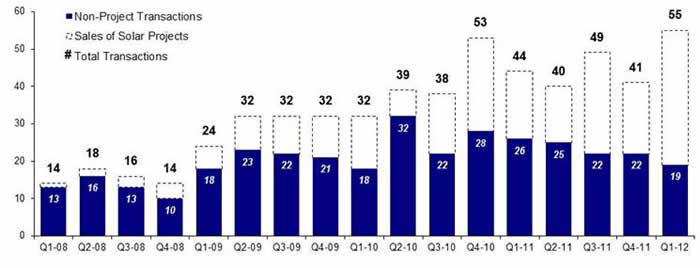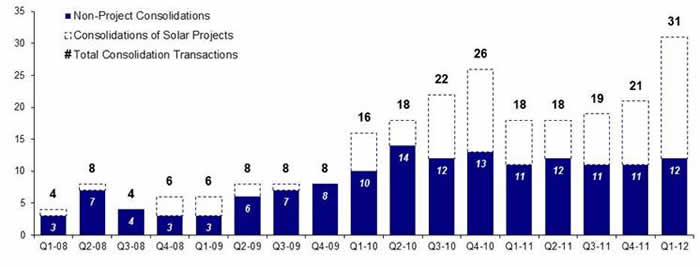Regulation continues to be a key influencer and driver of the overall solar marketplace. Despite the advantages of solar as a virtually free energy, the market relies on regulation in order to deliver desired returns on investment.
The Renewable Energy Market Climate
Chaim Lubin | Lincoln International
What is the current market climate for the renewable energy industry?
 The solar industry operates as a highly global marketplace and despite some difficulties in areas such as Europe, there remain areas of high growth expectations, including the United States. The U.S. market is very state-specific, and while some states have slowed there are new states such as Massachusetts and New York that are beginning to ramp up and exhibit significant opportunity. In addition, solar is an effective infrastructure investment in countries such as China and India, as these countries develop their entire electricity generation portfolios. The industry is certainly going through a shakeout within the panel manufacture sector; however, this should be healthy for the industry overall and it should emerge stronger from it as a result.
The solar industry operates as a highly global marketplace and despite some difficulties in areas such as Europe, there remain areas of high growth expectations, including the United States. The U.S. market is very state-specific, and while some states have slowed there are new states such as Massachusetts and New York that are beginning to ramp up and exhibit significant opportunity. In addition, solar is an effective infrastructure investment in countries such as China and India, as these countries develop their entire electricity generation portfolios. The industry is certainly going through a shakeout within the panel manufacture sector; however, this should be healthy for the industry overall and it should emerge stronger from it as a result.
What are the main influencers on today’s market activity?
Regulation continues to be a key influencer and driver of the overall solar marketplace. Despite the advantages of solar as a virtually free energy, the market relies on regulation in order to deliver desired returns on investment. Helping move away from regulation being completely necessary is the drastic declines in panel costs. This has been driven by an oversupply of panels in the market, which is now being corrected through the sector shakeout.
The overall M&A activity seems to be slowing. Does this also hold true for the renewable energy industry? Why or why not?
From the solar M&A data tracked by Lincoln International, there has been growth in the sector over the last several years. Overall transaction activity has grown at an annual rate of above 40 percent since 2008. However, the growth in activity is somewhat bifurcated as the majority of growth has been the sale of solar projects. Non-project transaction activity has grown only 20 percent annually since 2008 and has actually been declining over the last six quarters since Q4 2010.
We expect solar project sale activity to continue to be robust as there are many projects available that are currently being constructed or are being operated by parties that do not want to own the projects for the long-term. In addition, non-project M&A could begin to increase again with the current market shakeout and pressure for further consolidation within the value chain.

Which renewable energy sectors are leading the pack as far as growth and market penetration?
Solar is one of the fastest growing sectors in the renewable energy industry. exhibiting an over 40 percent growth rate in 2011. We expect the industry to continue exhibiting robust growth over the long-term due to various factors. These factors include:
- Solar is a virtually free technology. Once the initial investment is made in the infrastructure of putting a system in place, there is limited maintenance necessary and the system generates electricity for an extended period of time (although most warranties on panels are for 25 years, historically panels continue to generate electricity well beyond this time period)
- Solar is very diverse in its installation applications being able to be put on a roof at the utilization source, as in a utility scale application for larger generation and off-grid as an answer for generation in areas that lack electric infrastructure. This flexibility provides optionality for consumers to install solar more specific to their energy needs.
- Solar’s ability to load match (i.e., solar generates the most electricity when the most electricity is being used) makes it a valuable and arguably necessary component of the overall energy portfolio.
What role does consolidation play in M&A activity specific to the renewable energy industry?
Overall consolidation activity has increased significantly over the last several years (more than 50 percent annually since 2008). When this is broken down between the consolidation of companies versus the consolidation and accumulation of solar project portfolios, it tells somewhat of a different story than the overall M&A activity. While consolidation of solar projects and project portfolios have grown significantly, consolidations of companies have as well. Over the last several quarters, while non-project transaction activity has been declining, the number of non-project consolidations has remained relatively consistent and at a high level.
This level of activity highlights what all industries face, in that all experience several waves of consolidations as they mature and grow. For example. at the dawn of the 20th century there were more than 400 automotive manufacturers in the United States. Over the next 20 years, through multiple waves of consolidation and shakeout, this number declined to fewer than 30. Solar is no different in that firms will consolidate to better scale and build their business models and some companies will get shaken in the normal course of economic growth. Companies need to determine whether they are a buyer or a seller in order to structure their business models accordingly so as not to succumb to being pushed out of the market.

What advice do you have for business owners in the renewable energy sector as they are considering a merger, sale or acquisition?
With regard to project owners, many project sales are not done efficiently. Buyer groups are not canvassed globally and most often a formal process is not conducted for the project sale. Therefore, project owners should consider hiring an advisor who can run an efficient global process and market the projects to interested buyer groups around the world at the same time.
Companies need to determine if they are an “acquirer” or a “seller” over the long-term. Based on this decision, the business plans of the companies should be developed to support this objective. If the company is an acquirer, it should seek out acquisitions that build the company’s core, increase value add and improve profitability. If a seller, the company should focus on improving cash flow and determine the appropriate timing for a sale.
What part of the world has the most active renewable energy industry and why?
This is a continually shifting metric. Historically Europe was the most robust geographic area due to its attractive policies for solar, but now the U.S. is growing very rapidly. Additionally, there is a lot of expected growth in emerging markets as these countries make significant infrastructure investments in building more robust electricity generation. In these areas, growth has the potential to be even more significant as the investment in solar is not a replacement of existing infrastructure, rather it is the initial investment.
Can the renewable energy industry thrive without government subsidies and tax incentives?
No energy business or energy type has ever been created without government participation. For example, the oil industry utilizes depletion allowances (a government imposed tax incentive) and major energy infrastructure investments such as the Hoover Dam or TVA would not have been completed without government assistance. It can be argued that renewable energy is one of the least subsidized forms of energy, but even renewable energy will need government incentives to build out scale and infrastructure as it becomes a more mainstream energy source.
Chaim Lubin
Role at Lincoln International
Chaim Lubin is a vice president at Lincoln International and leads or assists in leading deal teams and is active in marketing the services of Lincoln International. Chaim is a key member of the firm's Electronics and Renewable Energy groups and is heavily involved in executing transactions for these groups.
Advisory Expertise
Chaim has experience in advising companies on mergers and acquisitions, restructuring, fairness opinions, and other strategic matters. His experience includes transactions and advisory services for private equity, Fortune 500, and private company clients. Chaim also has cross-border transaction experience, providing advisory services for transactions involving companies in geographies across Asia and Europe.
Industry Expertise
Chaim specializes in the electronics and renewable energy industries, though he has also been actively involved with companies in the industrial technology, building products, chemicals, office products, and manufacturing & distribution industries. He has relationships with leaders in the renewable energy industry and active acquirers in the electronics industry as well as with contacts throughout the private equity community. Chaim has a strong understanding of the dynamics in the rapidly growing solar industry, and a keen sense of what makes companies and projects attractive and how best to position these to potential partners.
Past Affiliations
Prior to joining Lincoln International, Chaim worked in public accounting for Feeley and Driscoll, P.C. in Boston. Chaim advised and worked with companies in the technology, construction, healthcare, legal, and manufacturing & distribution industries. Chaim is a licensed CPA.
Academic Credentials
Chaim earned a Master of Business Administration degree from the Kellogg School of Management at Northwestern University, a Master of Engineering Management from the McCormick School of Engineering and Applied Science at Northwestern University, and a Bachelor of Science degree from Boston University with Honors.
The content & opinions in this article are the author’s and do not necessarily represent the views of AltEnergyMag
Comments (0)
This post does not have any comments. Be the first to leave a comment below.
